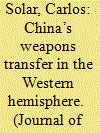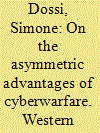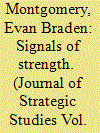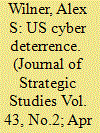| Srl | Item |
| 1 |
ID:
173807


|
|
|
|
|
| Summary/Abstract |
What characterises China’s weapons diplomacy and how does it unfold in the current security scenario in the Western Hemisphere? This article argues that Chinese arms deliveries have arrived in the region together with the expansion of commerce and trade routes as evidenced in Africa, Asia, and the Middle East. In Latin America and the Caribbean, states seek to buy weapons in light of contentious border hot spots and intrastate rampant violence. China is a wilful seller and, to accomplish this, it has developed a weapons transfer policy taking advantage of the post-hegemony of the United States. The article argues that Beijing’s successes could reverse due to the lack of interstate armed conflict, and the less belligerent military missions adopted by the armed forces. Yet, Chinese arms transfers in the Western Hemisphere and other parts of the developing world reveal a complex security governance regime where the military, industry, and diplomatic policy communities interact.
|
|
|
|
|
|
|
|
|
|
|
|
|
|
|
|
| 2 |
ID:
173809


|
|
|
|
|
| Summary/Abstract |
An issue that has been widely debated in the West is whether cyberwarfare gives militarily weaker actors asymmetric advantages. Is cyberwarfare a weapon of the weak? Or does it rather multiply the advantages enjoyed by militarily superior actors? These questions have major implications for China, which – as a rising power – must face stronger and weaker opponents at the same time. Based on an analysis of the Chinese journal Guofang Keji, this article investigates how China’s strategic community theorises advantage and disadvantage in the cyber domain and how this differs from Western perspectives on cyberwarfare.
|
|
|
|
|
|
|
|
|
|
|
|
|
|
|
|
| 3 |
ID:
173806


|
|
|
|
|
| Summary/Abstract |
When and why might a rising China challenge the power and security of a relatively declining United States? Conventional wisdom argues that China – like other rising states – is apt to adopt an increasingly ambitious strategy that imperils US interests as its relative power grows. Drawing on balance of power theory, I instead argue that the threat of Chinese predation is overstated. Rising in a crowded geopolitical neighbourhood, China faces incentives to avoid preying on the United States, and may even have reason to cooperate with the United States over the long term.
|
|
|
|
|
|
|
|
|
|
|
|
|
|
|
|
| 4 |
ID:
173810


|
|
|
|
|
| Summary/Abstract |
States often use demonstrations to improve perceptions of their military power. This topic has received limited attention in the literature, which typically assumes that states disguise or downplay their capabilities, advertise them only to enhance their prestige, or use demonstrations to communicate interests and resolve. Because military strength can be difficult to gauge, however, successful deterrence and assurance can require demonstrations to ensure that capabilities are viewed as credible. This article explains the logic of capability demonstrations, identifies the conditions under which they have the most utility, introduces a typology of demonstration mechanisms, and describes how emerging technology influences demonstrations.
|
|
|
|
|
|
|
|
|
|
|
|
|
|
|
|
| 5 |
ID:
173808


|
|
|
|
|
| Summary/Abstract |
When compared to advancements in conceptualising deterrence in other domains, cyber deterrence is still in it messy infancy. In some ways cyber deterrence practice outpaces cyber deterrence theory. Tactics, strategy, doctrine, and policy are developed and put to use even before corresponding theories are properly understood. This article analyses how American cyber deterrence has been implemented over the past two decades in order to inform ongoing debates within the academic study of deterrence, and to provide insights from practice for how cyber deterrence theory can be better conceived and refined.
|
|
|
|
|
|
|
|
|
|
|
|
|
|
|
|